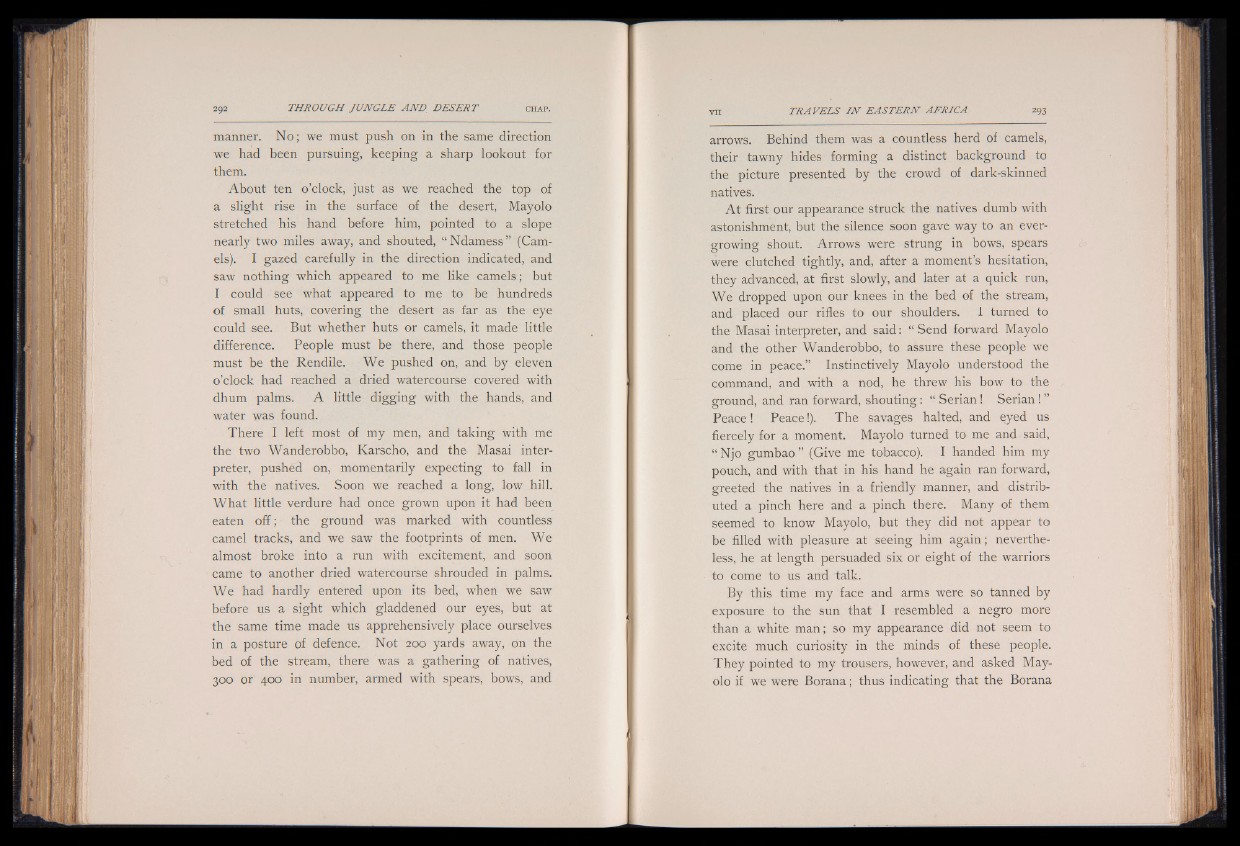
manner. No; we must push on in the same direction
we had been pursuing, keeping a sharp lookout for
them.
About ten o’clock, just as we reached the top of
a slight rise in the surface of the desert, Mayolo
stretched his hand before him, pointed to a slope
nearly two miles away, and shouted, “ Ndamess ” (Camels).
I gazed carefully in the direction indicated, and
saw nothing which appeared to me like camels; but
I could see what appeared to me to be hundreds
of small huts, covering the desert as far as the eye
could see. But whether huts or camels, it made little
difference. People must be there, and those people
must be the Rendile. We pushed on, and by eleven
o’clock had reached a dried watercourse covered with
dhum palms. A little digging with the hands, and
water was found.
There I left most of my men, and taking with me
the two Wanderobbo, Karscho, and the Masai interpreter,
pushed on, momentarily expecting to fall in
with the natives. Soon we reached a long, low hill.
What little verdure had once grown upon it had been
eaten o ff; the ground was marked with countless
camel tracks, and we saw the footprints of men. We
almost broke into a run with excitement, and soon
came to another dried watercourse shrouded in palms.
We had hardly entered upon its bed, when we saw
before us a sight which gladdened our eyes, but at
the same time made us apprehensively place ourselves
in a posture of defence. Not 200 yards away, on the
bed of the stream, there was a gathering of natives,
300 or 400 in number, armed with spears, bows, and
arrows. Behind them was a countless herd of camels,
their tawny hides forming a distinct background to
the picture presented by the crowd of dark-skinned
natives.
A t first our appearance struck the natives dumb with
astonishment, but the silence soon gave way to an evergrowing
shout. Arrows were strung in bows, spears
were clutched tightly, and, after a moment’s hesitation,
they advanced, at first slowly, and later at a quick run,
We dropped upon our knees in the bed of the stream,
and placed our rifles to our shoulders. I turned to
the Masai interpreter, and said: “ Send forward Mayolo
and the other Wanderobbo, to assure these people we
come in peace.” Instinctively Mayolo understood the
command, and with a nod, he threw his bow to the
ground, and ran forward, shouting: “ Serian! Serian ! ”
Peace! Peace!). The savages halted, and eyed us
fiercely for a moment. Mayolo turned to me and said,
“ Njo gumbao” (Give me tobacco). I handed him my
pouch, and with that in his hand he again ran forward,
greeted the natives in a friendly manner, and distributed
a pinch here and a pinch there. Many of them
seemed to know Mayolo, but they did not appear to
be filled with pleasure at seeing him again; nevertheless,
he at length persuaded six or eight of the warriors
to come to us and talk.
By this time my face and arms were so tanned by
exposure to the sun that I resembled a negro more
than a white man; so my appearance did not seem to
excite much curiosity in the minds of these people.
They pointed to my trousers, however, and asked Mayolo
if we were Borana; thus indicating that the Borana